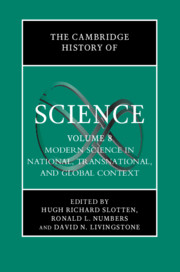Book contents
- The Cambridge History of Science
- The Cambridge History of Science
- The Cambridge History Of Science
- Copyright page
- Contents
- Notes on Contributors
- General Editors’ Preface
- 1 Introduction
- Part I Transnational, International, and Global
- 2 Science and Imperialism since 1870
- 3 The Geomagnetic Project: Internationalism in Science between the French Revolution and the Franco-Prussian War
- 4 International Science from the Franco-Prussian War to World War Two: An Era of Organization
- 5 Internationalism in Science After 1940
- 6 International Science in Antarctica
- 7 Missionary Science
- 8 Museums of Natural History and Science
- 9 National Scientific Surveys
- 10 Expeditionary Science
- Part II National and Regional
- Index
5 - Internationalism in Science After 1940
from Part I - Transnational, International, and Global
Published online by Cambridge University Press: 21 March 2020
- The Cambridge History of Science
- The Cambridge History of Science
- The Cambridge History Of Science
- Copyright page
- Contents
- Notes on Contributors
- General Editors’ Preface
- 1 Introduction
- Part I Transnational, International, and Global
- 2 Science and Imperialism since 1870
- 3 The Geomagnetic Project: Internationalism in Science between the French Revolution and the Franco-Prussian War
- 4 International Science from the Franco-Prussian War to World War Two: An Era of Organization
- 5 Internationalism in Science After 1940
- 6 International Science in Antarctica
- 7 Missionary Science
- 8 Museums of Natural History and Science
- 9 National Scientific Surveys
- 10 Expeditionary Science
- Part II National and Regional
- Index
Summary
There is a paradoxical quality to international science after 1940. World War II and the Cold War restricted many traditional avenues of scientific internationalism: atomic physics and allied fields became shrouded in national security restrictions; basic data (including sea floor soundings and geodetic data) were restricted or classified; and communications between Western and Soviet scientists frayed. Espionage agencies recruited scientists, international scientific meetings were postponed or delayed, and the universalist practices of science were attacked as unpatriotic and dangerous within leading scientific nations.
- Type
- Chapter
- Information
- The Cambridge History of Science , pp. 60 - 74Publisher: Cambridge University PressPrint publication year: 2020

